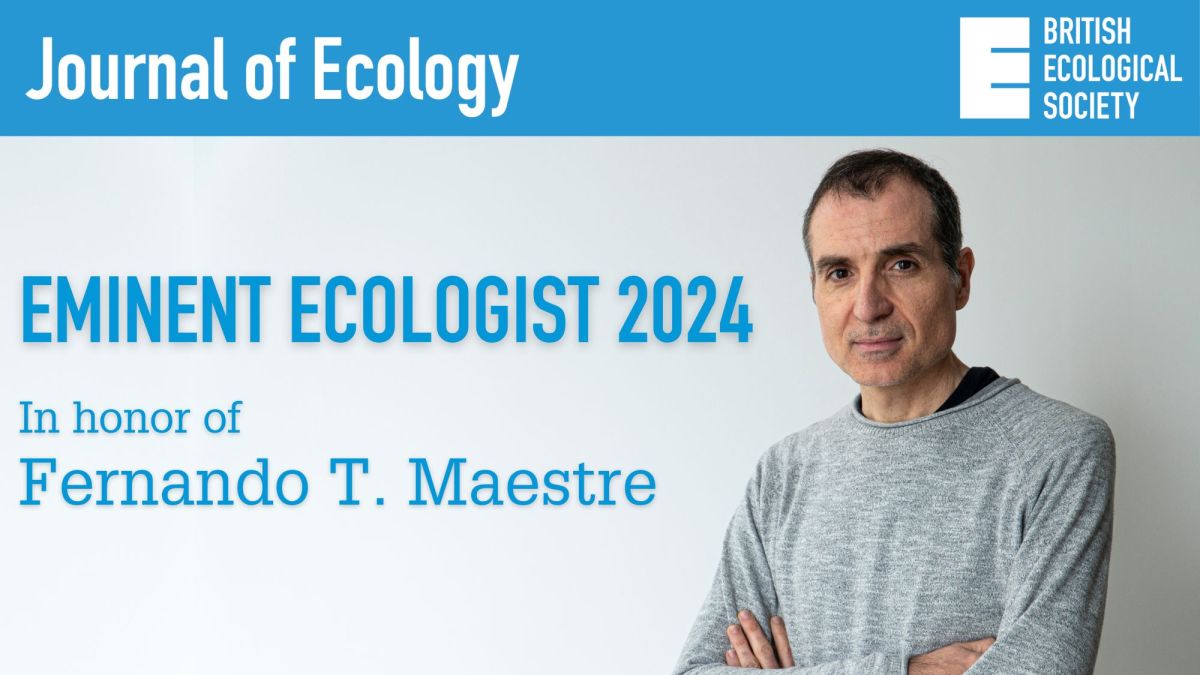The Journal of Ecology Editors are delighted to announce that Fernando Maestre is our Eminent Ecologist award winner for 2024!
In recognition of his work, we asked Fernando to put together a virtual issue of some of his favorite contributions to the journal. Fernando has also written this blog series, and was interviewed by Richard Bardgett about about how he started his career in ecology, how he uses his work to inform decision making, and the advice he’d give to someone about to embark on a career in ecology. Fernando’s full blog series can be found here: Part 1👇 | Part 2 (coming soon) | Part 3 (coming soon) | Part 4 (coming soon) | Part 5 (coming soon)
Part I. Introduction
When I was younger, I always liked to say that good news comes by post. Nowadays it usually comes by email and this summer I received one of these emails, one that was totally unexpected to me. When Richard Bardgett told me that I have been named Eminent Ecologist 2024 by the Editors of Journal of Ecology, I had to read his email several times as I could not believe it. I have been incredibly fortunate to receive multiple awards over my career, many more than I could ever imagined when I started my scientific journey as a PhD student in 1999. All of them are very special to me, but receiving this Award from Journal of Ecology, which is my favorite journal (with 26 articles it is the journal where I have published the most), has touched me deeply. Seeing my name alongside the distinguished colleagues that previously have received this award is dizzying (“da vértigo” as we say in Spanish)!
I feel very honored by this Award, so I would like first to express my most sincere thanks to the Editors of Journal of Ecology for their consideration, to my family for all their love and support, to my mentors, to all the institutions and colleagues that have hosted me during my career and have supported and funded my training and research, and to all the members and collaborators of the Dryland Ecology and Global Change Lab over the years. Without their talent, illusion, and work I would have not been able to do the science that led to the different papers published in this journal (and elsewhere), and thus to be here today writing these lines. As one of my favorite Spanish proverbs says “Es de bien nacido ser agradecido” (gratitude is the sign of noble souls), so a huge thank you all!
This Award has been also a wonderful opportunity to reflect about all the interactions I had with the journal as a reader, author, reviewer, and editor. Journal of Ecology has been not only a key journal to submit our research, but also a continuous source of inspiration for my work and a key reference for learning and catching up on the most relevant plant and ecosystem ecology science since my early PhD days. I still remember very well the first paper I submitted to the journal as a PhD student. It was rejected, but we received very constructive comments and a very polite rejection letter that I keep at home (I am old enough to have lived during the times when you submitted your papers and received journal decisions by post). We should treat others like we like to be treated and this first decision letter from the Journal, and the tone of such a letter guided my work as an editor and reviewer (I always have tried to provide useful feedback and to write polite, constructive, and positive letters to authors). I had the incredible opportunity to spend five very enjoyable years (2006-2011) handling papers as an Associate Editor for the journal. I still remember very well how happy and honored I was when Michael Hutchings, then Executive Editor, invited me to join the Editorial Board, and how difficult it was to write to him five years later to step down. Being an editor for the journal has been a major highlight in my career and a great learning experience from authors, fellow editors, and the British Ecological Society (BES) editorial staff. I certainly believe that the way articles are handled and authors are communicated with, is a major asset of any journal, and one we must take care of and improve as much as possible. Journal of Ecology has done over the years a great job in this regard, and everyone at the BES should feel very proud of this.
All the papers I have published in the journal are special and important to me, so it has not been easy to select 12 of them to celebrate this Award. To avoid making a very long (and likely boring) blog post I have grouped the 12 papers in three key topics I have worked on over my career (biotic interactions, biocrust ecology, and observational studies conducted along regional and global gradients), which are the focus of each of the three posts that follow this introductory one. These will be followed by a closing epilogue.

I will also use the presentation of different articles in this virtual issue to reflect on the processes and circumstances that led to them, to share some personal anecdotes and parts of my professional journey -together with lessons learned along the way-, and to discuss important aspects that have guided my work over the years. Thanks for reading and I hope that you will like them!
Fernando T. Maestre, King Abdullah University of Science and Technology.
Fernando was interviewed by Richard Bardgett about about how he started his career in ecology, how he uses his work to inform decision-making, and the advice he’d give to someone about to embark on a career in ecology:


